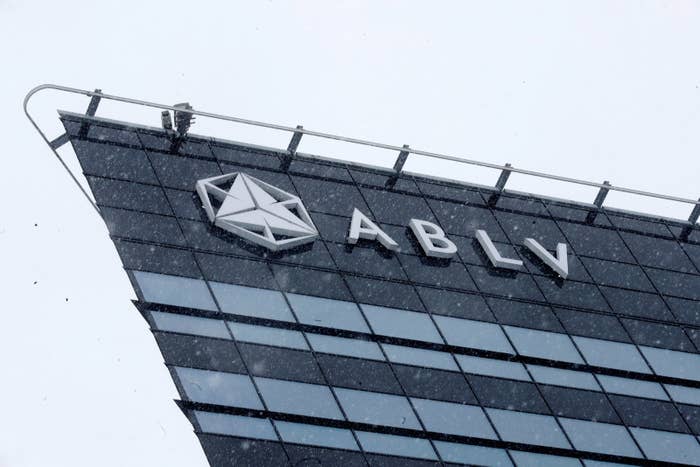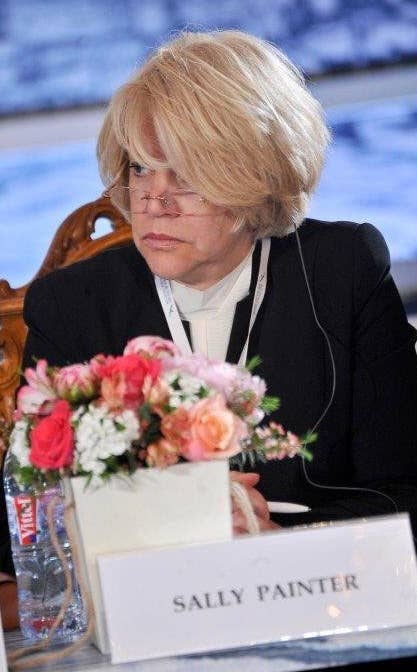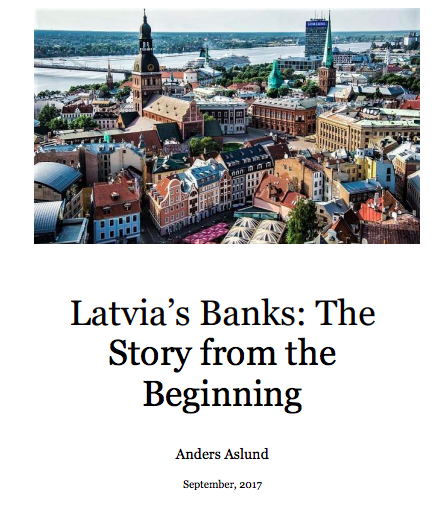
The Washington-based Atlantic Council has long had a reputation of being tough on Russia and its shadowy expansionist foreign policy. The organization recently launched a website focused on Russian disinformation efforts and runs discussions on bolstering US alliance with countries in the Baltics and Eastern Europe.
Now, however, a paper produced by a senior fellow at the council and commissioned by a member of the Atlantic Council’s board of directors raises questions about whether the council is being transparent about its affiliates’ links to organizations that might serve Russian interests.
The paper was written and made public in September by Atlantic Council Senior Fellow Anders Aslund, a prominent Swedish economist who lives in the United States. In it, Aslund argued that Latvia’s banks — long criticized as rife with money laundering, much of which is thought to involve Russian clients — had made great strides in enforcing anti–money laundering statutes. Aslund told Re:Baltica, a website that collaborated with BuzzFeed News on this story, that he was asked to write the paper by Sally Painter, a longtime lobbyist for Latvia’s nonresident banks who was named to the Atlantic Council’s board in April 2017.

Aslund acknowledged in correspondence with BuzzFeed News that a consortium of Latvian banks paid him to write the paper. Those banks included a subsidiary of ABLV Bank, which, at the time, was trying to win permission to establish a branch in the United States. That effort failed, however, after the US Treasury Department’s Financial Crimes Enforcement Network in February named ABLV as a bank of "primary money laundering concern."
"FinCEN has reasonable grounds to believe that ABLV executives, shareholders, and employees have institutionalized money laundering as a pillar of the bank’s business practices," the Treasury Department said when it announced that its intention to prohibit ABLV from clearing dollar-denominated transactions through US banks.
"ABLV management permits the bank and its employees to orchestrate and engage in money laundering schemes; solicits the high risk shell company activity that enables the bank and its customers to launder funds; maintains inadequate controls over high-risk shell company accounts; and seeks to obstruct enforcement of Latvian anti-money laundering and combating the financing of terrorism (AML/CFT) rules in order to protect these business practices," the announcement said.
It added that some of that "illicit financial activity ... included transactions for parties ... involved in North Korea’s procurement or export of ballistic missiles."
The statement also singled out money laundering for "corrupt politically exposed persons," saying ABLV "has funneled billions of dollars in public corruption and asset stripping proceeds through shell company accounts. ABLV failed to mitigate the risk stemming from these accounts, which involved large-scale illicit activity connected to Azerbaijan, Russia, and Ukraine."
Shortly after the FinCEN report was made public, ABLV was forced to close.
A spokesperson for ABLV, Arturs Eglitis, confirmed that one of the bank's subsidiaries "was involved in financing this report."

"It's not a secret that ABLV’s subsidiary has opened an office in US with a long-term goal to open the branch of the bank. Aslund's report was presented in the Atlantic Council to tell about the achievements in Latvia's banking sector," Eglitis wrote in an email to Re:Baltica.
Who read Aslund’s paper is not clear. The paper was presented at a private event hosted by the Atlantic Council in Washington in October, but it was not an official Atlantic Council publication and cannot be found on the Atlantic Council website, though Aslund’s Atlantic Council affiliation is the first item noted in the paper’s explanation of its authorship.
Aslund did disclose the project to the Atlantic Council, as fellows are required to disclose outside sources of income, according to Damon Wilson, the council’s executive vice president. "I became aware that Anders was doing in a private capacity something with Sally Painter and Blue Star relating to the Latvian banks," Wilson said, though he did not know the exact content of the paper.
The paper does not mention Painter’s role in its creation. A longtime lobbyist for Latvian nonresident banks — that is, banks whose main business comes not from Latvian residents, but from foreigners — Painter is a cofounder and the chief operating officer of Blue Star Strategies, a Washington-based public relations firm that is listed in US House of Representatives records as having among its clients two companies related to ABLV: ABLV Advisory Services and ABLV Corporate Services. Painter herself was listed as a lobbyist in a 2007 filing that showed that a lobbying firm then known as Dutko Worldwide and now as Dutko Grayling had received $120,000 to lobby for the Latvian–American Financial Forum.
Painter was at the paper’s presentation, as were the Latvian ambassador to the United States and Aivis Ronis, a former Latvian foreign minister who was, at the time, a member of the ABLV board.
"The report and my service to the Atlantic Council speak for themselves," Painter wrote in response to a request for comment from BuzzFeed News.
Nicole Meir, a media representative for the Atlantic Council, said that neither Painter nor Aslund had broken council rules in commissioning and writing the report. "This report was commissioned by a private entity as a private engagement and had no Atlantic Council involvement. It was written and published outside the Council and without Council resources," she wrote in an email.
Asked whether ties to Latvian banking money hurt the Atlantic Council’s credibility, John Herbst, director of the Atlantic Council’s Eurasia Center and a former ambassador to Ukraine, told BuzzFeed News, "The short answer is no."
"We have a body of work on Latvia with a very clear message, which is: We want the country to be strong, to be independent. ... And we have done numerous events towards that end. So the fact that someone associated with us does a report on the banking system that’s presented at the Atlantic Council in no way detracts from or diminishes the work we’ve done," he said.
Wilson took a similar position. "My credibility is built on a 25-year career. Every Latvian politician has worked with and knows us," he said, adding that "this was not a council product."
A Blue Star Strategies representative also defended Painter’s role at the Atlantic Council, saying it was unrelated to her lobbying on behalf of Latvian banks accused of laundering Russian money. "For decades, Ms. Painter has promoted transatlantic relations through her pro-bono service, including her service with the Atlantic Council and through her work at Blue Star Strategies, LLC," the representative wrote.
As for Aslund, he stood behind his paper, despite the scathing FinCEN report that came just months later. "My verdict was they had done a lot, while I was careful not to say they had done enough," Aslund told BuzzFeed News. Aslund’s report itself reads, "Latvia no longer appears to be a significant concern for money laundering."
"I stand by my report. It is factually correct. It describes how Latvia has done so many different things to combat money laundering and how the situation has improved. I do not pass any judgment on individual banks or to what extent the policy has eventually succeeded," Aslund wrote in a final email. He did not answer an email asking how much he had been paid.
Springe and Jemberga reported from Riga, Latvia.
UPDATE
The Atlantic Council Defends Its Work With Latvia



